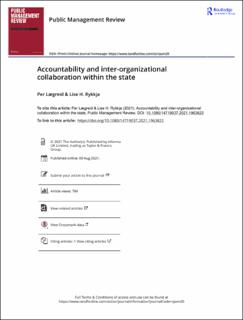Accountability and interorganizational collaboration within the state
Journal article, Peer reviewed
Published version

View/
Date
2021Metadata
Show full item recordCollections
- Department of Government [457]
- Registrations from Cristin [9791]
Abstract
This article discusses collaborative arrangements within the state and looks at their consequences for democratic accountability in networked governance involving public actors at different levels and in different policy areas. Applying an institutional perspective, it examines two such collaborations in Norway: work-related organized crime and vulnerable youths. It finds that horizontal collaborations incorporate local differentiation and expertise resulting in a ‘collaborative culture’ facilitating broader involvement and more deliberative processes. However, top-down mechanisms, organizational commitment, resource allocation, and monitoring are also important. The cases demonstrate a shift towards more informal, voluntary, and horizontal accountability existing in the shadow of hierarchy, constraining the collaborative arrangements’ effectiveness and making them more complex and multi-layered.
